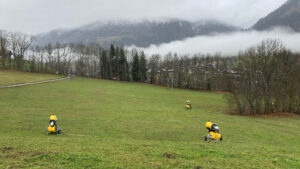Abstract/Description
Mountains have been often places of colonial fracture and capitalist extractivism as well as of refuge and resistance. In times of necropolitics (Mbembe), the relations with them are frequently marked by death and destruction. This artistic research, a Phd-in-Practice project at the Academy of Fine Arts Vienna, looks for ways to ethically re-relating with the mountains and acknowledging their interactions with us, particularly as migrant territories. That is, not as fixed entities but as territories traveling and transforming. The project considers indigenous epistemologies of territory as a place in ontological relation with all related beings and a feeling-thinking understanding of the world. These concepts are expanded through the Aymara ch’ixi positionality, the ambivalent mixture of fractured cultures, according to Silvia Rivera Cusicanqui, that presents how beings are and are not simultaneously. These ideas and the resistance of the mountains’ inhabitants bring possibilities of existence in the apparently empty spaces between the mountains. These spaces represent the (ultimately artificial) fractures of relationalities that the colonialism-capitalism complex produces locally and globally. The methodology develops a weaving in the wind of diverse mountain-beings precisely in those spaces. Through exercises of listening to our silences, the silences of the mountains and strategies of poetical resistance, a chain of relational artworks is created that helps to relate to the mountains. These artworks were created in collaboration with several communitary partners in four different phases (stations) in Germany, Mexico and Colombia, aimed at understanding mountains as traveling the spirals of space-time. This understanding is based upon indigenous epistemologies of time and belonging with the whole world as territory. The project focuses especially on the traveling of the mountains and their related beings along global value chains, a Global South-to-North movement that also corresponds to several migrational movements. In that way, human and nonhuman migration is also considered a form of movement of bodies-territories. Luis Ortiz was a recipient of a DOC Fellowship of the Austrian Academy of Sciences at the Institute of Cultural Studies of the Academy of Fine Arts Vienna.


